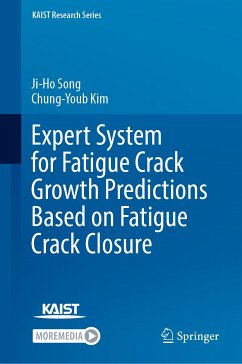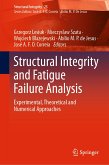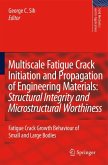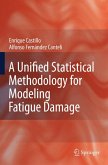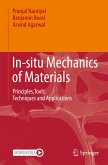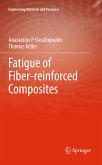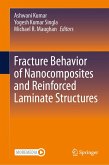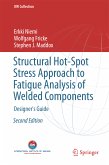Expert System for Fatigue Crack Growth Predictions Based on Fatigue Crack Closure (eBook, PDF)


Alle Infos zum eBook verschenken

Expert System for Fatigue Crack Growth Predictions Based on Fatigue Crack Closure (eBook, PDF)
- Format: PDF
- Merkliste
- Auf die Merkliste
- Bewerten Bewerten
- Teilen
- Produkt teilen
- Produkterinnerung
- Produkterinnerung

Hier können Sie sich einloggen

Bitte loggen Sie sich zunächst in Ihr Kundenkonto ein oder registrieren Sie sich bei bücher.de, um das eBook-Abo tolino select nutzen zu können.
This book demonstrates fatigue crack growth under random loading graphically. This state-of-the-art monograph introduces an expert system for crack growth predictions, particularly based on crack closure. The system is developed after years of research by the authors by using the Math-type software consisting of 5 parts. This system is unique as it is fundamentally different from previous systems as it focuses on fatigue crack growth predictions based on fatigue crack closure. This book can be a useful guide for practicing engineers, researchers, and students in the fields of mechanical, aerospace, or civil engineering.…mehr
- Geräte: PC
- ohne Kopierschutz
- eBook Hilfe
- Größe: 4.39MB
![Structural Integrity and Fatigue Failure Analysis (eBook, PDF) Structural Integrity and Fatigue Failure Analysis (eBook, PDF)]() Structural Integrity and Fatigue Failure Analysis (eBook, PDF)137,95 €
Structural Integrity and Fatigue Failure Analysis (eBook, PDF)137,95 €![Multiscale Fatigue Crack Initiation and Propagation of Engineering Materials: Structural Integrity and Microstructural Worthiness (eBook, PDF) Multiscale Fatigue Crack Initiation and Propagation of Engineering Materials: Structural Integrity and Microstructural Worthiness (eBook, PDF)]() Multiscale Fatigue Crack Initiation and Propagation of Engineering Materials: Structural Integrity and Microstructural Worthiness (eBook, PDF)233,95 €
Multiscale Fatigue Crack Initiation and Propagation of Engineering Materials: Structural Integrity and Microstructural Worthiness (eBook, PDF)233,95 €![A Unified Statistical Methodology for Modeling Fatigue Damage (eBook, PDF) A Unified Statistical Methodology for Modeling Fatigue Damage (eBook, PDF)]() Enrique CastilloA Unified Statistical Methodology for Modeling Fatigue Damage (eBook, PDF)73,95 €
Enrique CastilloA Unified Statistical Methodology for Modeling Fatigue Damage (eBook, PDF)73,95 €![In-situ Mechanics of Materials (eBook, PDF) In-situ Mechanics of Materials (eBook, PDF)]() Pranjal NautiyalIn-situ Mechanics of Materials (eBook, PDF)53,95 €
Pranjal NautiyalIn-situ Mechanics of Materials (eBook, PDF)53,95 €![Fatigue of Fiber-reinforced Composites (eBook, PDF) Fatigue of Fiber-reinforced Composites (eBook, PDF)]() Anastasios P. VassilopoulosFatigue of Fiber-reinforced Composites (eBook, PDF)73,95 €
Anastasios P. VassilopoulosFatigue of Fiber-reinforced Composites (eBook, PDF)73,95 €![Fracture Behavior of Nanocomposites and Reinforced Laminate Structures (eBook, PDF) Fracture Behavior of Nanocomposites and Reinforced Laminate Structures (eBook, PDF)]() Fracture Behavior of Nanocomposites and Reinforced Laminate Structures (eBook, PDF)145,95 €
Fracture Behavior of Nanocomposites and Reinforced Laminate Structures (eBook, PDF)145,95 €![Structural Hot-Spot Stress Approach to Fatigue Analysis of Welded Components (eBook, PDF) Structural Hot-Spot Stress Approach to Fatigue Analysis of Welded Components (eBook, PDF)]() Erkki NiemiStructural Hot-Spot Stress Approach to Fatigue Analysis of Welded Components (eBook, PDF)73,95 €
Erkki NiemiStructural Hot-Spot Stress Approach to Fatigue Analysis of Welded Components (eBook, PDF)73,95 €-
- -46%11
-
Dieser Download kann aus rechtlichen Gründen nur mit Rechnungsadresse in A, B, BG, CY, CZ, D, DK, EW, E, FIN, F, GR, HR, H, IRL, I, LT, L, LR, M, NL, PL, P, R, S, SLO, SK ausgeliefert werden.
- Produktdetails
- Verlag: Springer Nature Singapore
- Seitenzahl: 84
- Erscheinungstermin: 4. März 2022
- Englisch
- ISBN-13: 9789811680366
- Artikelnr.: 63558343
- Verlag: Springer Nature Singapore
- Seitenzahl: 84
- Erscheinungstermin: 4. März 2022
- Englisch
- ISBN-13: 9789811680366
- Artikelnr.: 63558343
- Herstellerkennzeichnung Die Herstellerinformationen sind derzeit nicht verfügbar.
